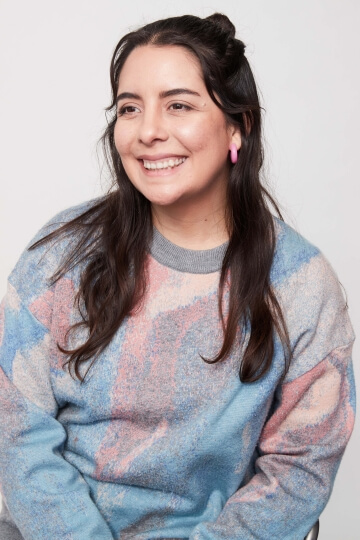Daniela Terán Endara, M.D.E. '20
Daniela Terán Endara always loved design, the feeling of crafting something with her own hands, but wanted to use those skills to do more than build commercial products or buildings.
“The goal for me has always been to design experiences or frameworks so people can have agency in finding their own solutions,” Terán said. “I’ve always wanted to do social impact work. My family does a lot of volunteering work, and it was important for me to have that in my professional life, and it didn’t really feel like I was getting that in architecture school.”
While pursuing an undergraduate degree in architecture in her native Ecuador, Terán did an exchange program with the University of Oregon. That was where she discovered the concept of human-centric design, which puts people’s needs and perspectives at the center of the design process. Wanting to explore that idea more, she eventually joined the Master in Design Engineering program co-run by Harvard John A. Paulson School of Engineering and Applied Sciences (SEAS) and Harvard Graduate School of Design. Through that program, Terán began to apply her design process to working with women in Latin American nations, and continued that work after completing her degree in 2020.
“I was looking for something interdisciplinary that was trying to solve complex challenges,” she said. “I was always curious about technology, which was far outside the scope of my work in Ecuador, so I felt like the M.D.E. program was a great fit.”
Part of Terán’s graduate studies brought her to the MIT D-lab, which uses design to address global challenges such as poverty and gender inequity. A class on gender and development in Latin America would prove especially inspiring for Terán, as lecturer Libby McDonald became her advisor. Once she graduated, Terán worked for McDonald at the D-Lab, where her main project involved women who were artisanal miners in Peru and Columbia.
“It was an amazing project,” Terán said. “We designed a movement-building program for them, a three-session curriculum that could guide women through a capacity-building process where they identify, process and ideate on the how to tackle gender-based violence in the gold mining value chain. We wanted to help them form associations that could advocate for change and work together for better labor conditions and work opportunities. After this program, some of the women decided to start a childcare facility for working miners.”
Working in the D-Lab isn’t the only way Terán has tried to improve life for women in Latin America. For her independent design engineering project at Harvard, Terán founded Mink’a, a developmental program for low-income women workers in Ecuador and Peru. The program designed a scalable framework and curriculum to analyze workers’ needs and support their agency and creative capacity to address those needs.
“I recognize that I came from a very privileged place in Ecuador,” she said. “My family could afford private education, which led me to a lot of opportunities. I’m motivated by the recognition that not everyone has that, and it guides me to especially focus on women, who have fewer opportunities.”
Terán paused her work with Mink’a in 2021 when she became a full-time design researcher at IDEO, a global design firm with a focus on human-centric design. But even at IDEO, she maintained her efforts to advance Latin American women, joining the employee research group for that community.
“What has been really fulfilling for me is being very active internally when it comes to diversity, equity and inclusion,” Terán said. “We do a lot of internal community-building, and it’s been a great learning experience in terms of how people make sense and try to do equity work here. It’s far different in Ecuador, so my hope is to eventually take all of these experiences back to Latin America.”
Even before coming to Harvard, Terán was already working to help low-resource communities. After getting her bachelor’s degree, she co-founded dxp, a design studio in Quito, and dxp-org, a non-profit focused on social innovation. One of her biggest pro bono projects with dxp-org was a year-long research process with a community in rural Ecuador which analyzed the causes of poverty and migration and helped identify potential solutions.
Using her design skills to help her community has always been a passion for Terán. SEAS and the M.D.E. degree expanded those skills, giving her even more design frameworks and systems thinking skills to take her impact to the next level.
“My professional journey keeps being like a rollercoaster, which I love,” Terán said. “Harvard was an amazing, life-changing experience. It’s opened so many doors, both professionally and in my mind.”
Press Contact
Matt Goisman | mgoisman@g.harvard.edu
